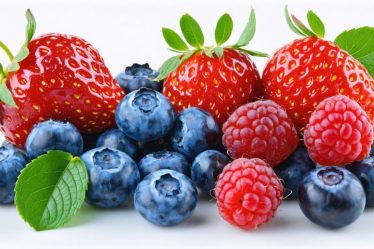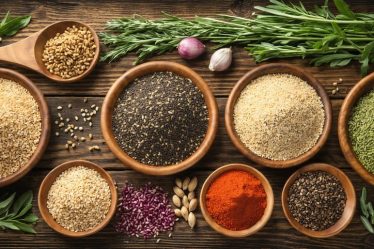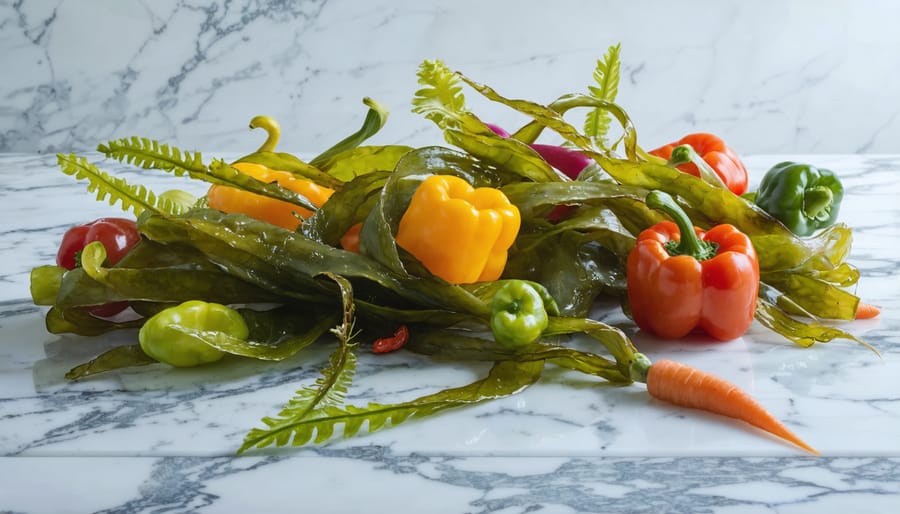
Dive into nature’s most nutrient-dense superfood from the sea – kelp packs more essential minerals and vitamins per gram than most land-based vegetables. This remarkable sea vegetable, a staple in traditional Japanese seafood cuisine, delivers an impressive array of nutrients: a single serving provides over 50% of your daily iodine needs, substantial amounts of vitamin K, folate, and magnesium, plus a unique blend of antioxidants. Whether you’re looking to boost your thyroid health, enhance mineral intake, or simply add more nutrient-rich foods to your diet, kelp offers an accessible and sustainable solution. Its versatility in the kitchen – from salads to smoothies to seasoning blends – makes it easy to incorporate into your daily routine, while its remarkable nutrient density makes every bite count toward your wellness goals.
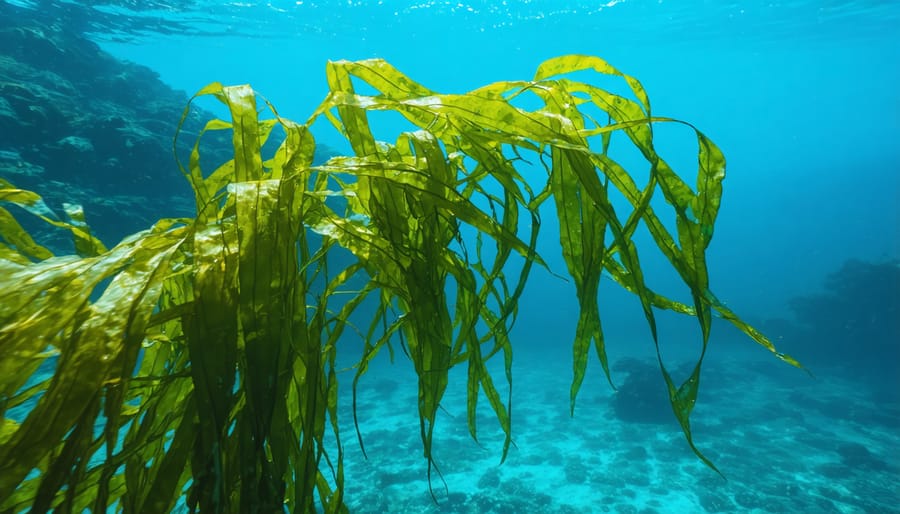
Essential Vitamins and Minerals in Kelp
Iodine and Thyroid Health
When I first discovered kelp’s incredible iodine content, it was a game-changer for my wellness journey. Think of kelp as nature’s thyroid supporter – just one serving can provide more than the daily recommended intake of iodine, a mineral many of us don’t get enough of in our regular diets.
Your thyroid gland absolutely loves iodine – it’s like fuel for this butterfly-shaped powerhouse in your neck. Without enough iodine, your thyroid might struggle to produce the hormones that regulate everything from your metabolism to your energy levels. That’s where kelp comes in as a superhero of the sea!
But here’s something important to remember, ladies: while kelp is amazing for thyroid health, moderation is key. A single gram of dried kelp typically contains between 200-1,000 micrograms of iodine. That’s plenty to support your thyroid function without going overboard. I like to think of it as adding a sprinkle of sea-powered goodness to my meals.
The best part? You don’t need much to reap the benefits. Adding just a small strip of dried kelp to your soups or sprinkling kelp flakes on your salads can help maintain healthy thyroid function while keeping your iodine levels in check.
Other Vital Minerals
Beyond its famous iodine content, kelp is a treasure trove of other essential minerals that our bodies need. I was amazed when I first learned that just a single serving of kelp provides significant amounts of iron – perfect for those of us who struggle to meet our daily requirements, especially during monthly cycles.
Calcium is another superstar mineral found abundantly in kelp, supporting our bone health and muscle function. As someone who’s always looking for dairy-free calcium sources, I love knowing that kelp has my back! The magnesium content is equally impressive, helping with everything from sleep quality to muscle recovery after those challenging workout sessions.
But that’s not all – kelp also contains zinc, copper, and manganese, working together to support our immune system and overall wellness. What I particularly love about getting these minerals from kelp is that they’re naturally occurring and typically easier for our bodies to absorb compared to synthetic supplements.
Think of kelp as nature’s mineral supplement – it’s like getting multiple nutritional benefits in one delicious, sea-sourced package!
Powerful Antioxidants and Beneficial Compounds
Let me share something exciting I discovered during my journey into seaweed nutrition – kelp isn’t just another green veggie; it’s one of nature’s true nutritional powerhouses, packed with unique antioxidants you won’t find in your regular garden produce!
The star players in kelp’s antioxidant lineup are phlorotannins, which are particularly powerful in fighting free radicals and reducing inflammation. Think of these compounds as your body’s personal defense team, working overtime to protect your cells from environmental damage. What makes them extra special is that they’re almost exclusively found in brown seaweeds like kelp!
Another fascinating compound in kelp is fucoidan, which has been making waves in the wellness community. This unique substance has shown promising effects in supporting immune health and maintaining healthy cell growth. As someone who’s always looking for natural ways to boost my wellness routine, learning about fucoidan was a game-changer!
Kelp also contains alginate, a compound that’s not only beneficial for our health but also helps with that feeling of fullness after meals. And let’s not forget about fucoxanthin, a carotenoid that gives kelp its distinctive color while offering potential metabolic benefits.
What I love most about these compounds is how they work together synergistically. While each one is impressive on its own, it’s their combination that makes kelp such a remarkable food. Plus, these antioxidants are particularly stable, meaning they maintain their benefits even after cooking – something I always consider when adding new ingredients to my kitchen arsenal.
Remember, incorporating kelp into your diet isn’t just about getting these amazing compounds; it’s about embracing a time-tested superfood that cultures have relied on for centuries. Whether you’re sprinkling some kelp flakes on your salad or adding it to your favorite soup, you’re tapping into an incredible source of natural antioxidants.
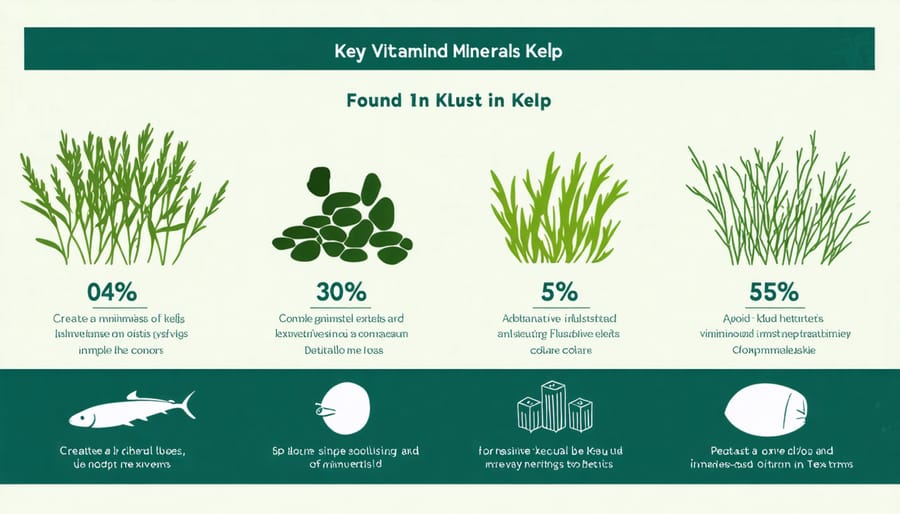
Beauty Benefits from Within
Ever noticed how some of your favorite beauty influencers have been raving about kelp supplements lately? There’s a good reason for that! This amazing sea vegetable isn’t just another trendy ingredient – it’s a natural beauty powerhouse that works from the inside out.
The secret lies in kelp’s impressive nutrient profile. Its high iodine content helps maintain healthy thyroid function, which directly impacts your skin’s appearance and hair growth. But that’s just the beginning of kelp’s beauty benefits.
Think of kelp as your skin’s best friend. Its abundant antioxidants help protect your skin from environmental damage, while its omega-3 fatty acids contribute to that coveted natural glow. The zinc and vitamin C content support collagen production, helping to maintain skin elasticity and reduce the appearance of fine lines.
For those dreaming of stronger, shinier hair, kelp’s iron and vitamin A content can help make that a reality. These nutrients are essential for healthy hair growth and can help prevent hair loss. Plus, the minerals in kelp strengthen your nail beds, reducing brittleness and promoting healthier growth.
The best part? You don’t need an expensive beauty routine to reap these benefits. Adding kelp to your diet through supplements or food can help you achieve that natural radiance you’ve been looking for. It’s like having a beauty treatment from the ocean, working its magic from within.
Remember, consistency is key when it comes to seeing results. Your body will thank you for this nutrient-rich addition to your beauty routine!
Delicious Ways to Add Kelp to Your Diet
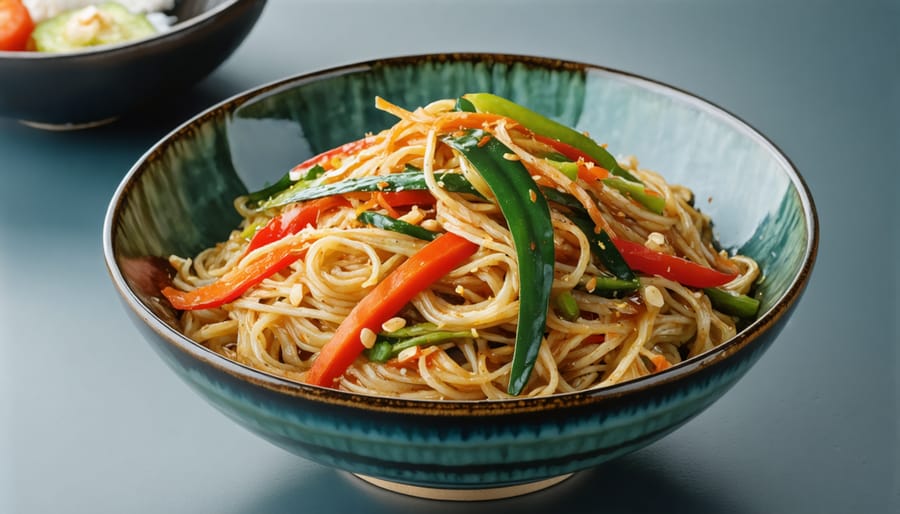
Simple Kelp Recipes
Ready to transform your kelp into delicious, nutrient-packed meals? I’ve discovered some fantastic ways to incorporate this sea vegetable into everyday dishes. Here’s my go-to collection of simple kelp recipes that perfectly align with your personalized nutrition benefits.
Start with a refreshing Kelp Noodle Stir-Fry: Simply soak kelp noodles for 10 minutes, then toss with your favorite vegetables, a splash of sesame oil, and tamari sauce. For a nourishing breakfast, try my Kelp Smoothie Bowl: blend a tablespoon of kelp powder with frozen berries, banana, and plant-based milk, then top with granola and fresh fruit.
Looking for something cozy? My Miso Soup with Kelp strips is perfect: simmer kelp strips in vegetable broth, add miso paste, tofu cubes, and green onions. For a quick snack, sprinkle dried kelp flakes over popcorn or roasted chickpeas – it adds a delicious umami flavor and boosts the nutrient content.
Remember to start with small amounts and adjust according to your taste preferences. These recipes are just starting points – feel free to experiment and make them your own!
Shopping and Storage Tips
When I’m shopping for kelp, I always look for products with vibrant, dark green colors and clear packaging that lets me inspect the quality. Whether you’re choosing dried kelp sheets, powder, or supplements, make sure to check the expiration date and opt for trusted brands that prioritize sustainable harvesting.
For dried kelp, store it in an airtight container in a cool, dark place – I keep mine in the pantry alongside other dried goods. It can last up to two years when stored properly! If you’re using fresh kelp (which can be harder to find), rinse it thoroughly and store it in the refrigerator wrapped in damp paper towels for up to a week.
Kelp powder should be kept in its original container or transferred to an airtight jar, away from moisture and direct sunlight. A helpful tip I learned from my local health food store: if your kelp powder starts clumping, it might have been exposed to moisture and should be replaced.
For supplements, follow the storage instructions on the package, typically keeping them in a cool, dry place away from direct sunlight.
As we’ve discovered, kelp is truly a nutritional powerhouse that deserves a spot in your healthy eating routine. From its impressive iodine content to its rich array of vitamins and minerals, this sea vegetable offers benefits that can support everything from thyroid health to glowing skin. The best part? Adding kelp to your diet doesn’t have to be complicated or overwhelming.
Whether you start with a sprinkle of kelp flakes on your morning eggs, blend some kelp powder into your favorite smoothie, or experiment with whole kelp noodles in your stir-fries, there are countless delicious ways to enjoy this nutrient-dense food. I personally love adding it to miso soup for an extra boost of minerals!
Remember, small changes can lead to big results when it comes to nutrition. If you’re new to kelp, start slowly and find the preparation method that works best for you. Your body will thank you for introducing this mineral-rich superfood into your diet. Ready to dive into the world of kelp? Your next healthy meal adventure awaits!
Like many of you in our community, I was once hesitant about trying sea vegetables. Now, I couldn’t imagine my kitchen without them. Give kelp a chance – you might just discover your new favorite nutritious ingredient!

